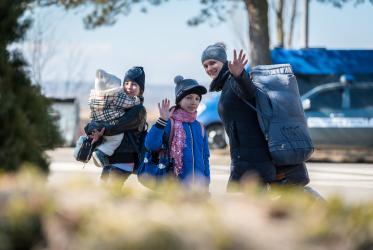Teenagers pose lots of challenges for any parent. Emotional, rebellious, and subject to inevitable pressures, it is undoubtedly difficult to raise children who are transitioning from becoming children to adults. I am in this situation—I have three. As I reflect on their growing into individualized people, I can only hope that, once they embark on their respective paths, they live in a society that is peaceful and accepting.
One of the ways we can approach peace is to be in dialogue with one another. One of my motives for writing my book Embracing the Other, was to unravel some of the fears we may have of the Other and to break down the walls that segregate us. This can be done through listening and understanding each other.
Religions have been one of the forces in creating division. We tend to be afraid and anxious of the faces of strangers—people who are unfamiliar. Our personal faiths tend to prevent us from loving one another and tend to alienate one from the other.
But there are religious groups who are trying to build understanding and welcoming of each other. The World Council of Churches (WCC) has been working toward that end, striving for acceptance of one faith by another.
The WCC is an ecumenical body of many different Christian denominations from virtually all bands of the spectrum who began to work toward building ecumenical understanding and Christian fellowship in 1948. The WCC brings together 348 member churches, including the Anglican Communion, the Assyrian Church of the East, most jurisdictions of the Eastern Orthodox Church, the Old Catholic Church, the Oriental Orthodox Churches, most mainline Protestant churches (such as Lutheran, Mennonite, Methodist and Reformed) and some evangelical Protestant churches (such as Baptist and Pentecostal).
The WCC sees itself and its member churches as on a pilgrimage of justice and peace, exploring how religions have a responsibility to be peace builders in our society. During this anxious time elections in the United States, people around the world are watching with curiosity, concern, and fear.
They understand that the rhetoric Donald Trump is using to build a bigger wall between the United States and Mexico is a narrative of separation and racism rather than communion. Trump’s desire to bar Muslims from entry into the United States is also feeding our Islamophobia and xenophobia. Americans cannot live in fear of the other and still expect to be at ease with the rest of the world community. We need to learn how we can be good, kind, and loving toward our neighbors.
In light of the desire to engage in dialogue, the WCC invited the Grand Imam of Al-Azhar to the Ecumenical Center to a dialogue on peace. The chief cleric of Cairo’s prestigious Al-Azhar mosque and university, Prof. Dr Ahmad al-Tayyeb gave a public lecture and participated in high-level talks on interreligious peacemaking. Al-Tayyeb was chosen in 2010 as Grand Imam of the Al Azhar mosque in Cairo and is an advocate for religious dialogue and peace.
He is a strong critic of religious extremism. In 2016, he made a historic visit to the Vatican to meet with Pope Francis, and he visited Paris six months after terrorist attacks in that city.
The WCC general secretary, Rev. Dr. Olav Fykse Tveit, stated, “We are honored to welcome one of the world’s highest-ranking and most influential Muslim leaders to Geneva, and I very much look forward to his lecture and to sharing views with him on the many challenges that we as religious persons and leaders face together”.
Dialogue like this, between Christians and Muslims, makes me realize that we have much more in common than others may believe, based on superficial differences. The Grand Imam emphasized that the word Islam comes from the word Peace. Peace is one of God’s names. God’s name is merciful, full of love.
Muslims are people who do not believe in injustice against non-Muslims. They are against terrorism. They do not promote acts of shedding blood. Islam is about peace, and they want to build peace between religious leaders and their flocks.
“Religion should give people hope,” Tveit said. “We are not only accountable to the texts as expressions of the Word of God,” he said. “We are also accountable for how we use them (or abuse them) in sharing them with the fellow human beings of today who need hope for tomorrow”.
The Grand Imam reminded us that the Qur’an requires Muslims to have good relations with their neighbors. We are a global family. Our lives are intertwined. We must claim hope in the midst of diversity.
When God asks Cain, “Where is your brother?” Cain replies, “Am I my brothers’ keeper?” Yes, he was supposed to protect and love his brother. To have peace in the world, we must engage in dialogue with one another and provide our common ground to work for peace.
In our competitive and globalizing world, it is more important than ever to work toward peace. There is a stronger need for formal rules to work and build harmony in this nation. This is not an issue of tolerance; it is the issue of welcoming the stranger. Jesus said, “Whatever you did for one of the least of these brothers and sisters of mine, you did for me” (Matthew 25:40).
As my children get older, I want to ensure that the world we leave behind will not be a world of fear, intolerance, hate, and walls. I want to ensure a world of peace, even with those who are most alien to us. We need to remember that all human beings are created in the image of God and religions should never be used to justify violence. We need to demand engagement in paving a road of peace and love for our children, who will live in a ever-more connected world.






